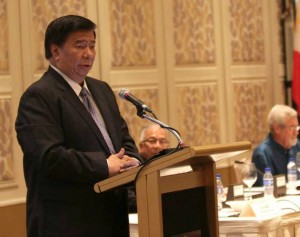
MANILA – Senate President Franklin Drilon urged the Commission on Elections (Comelec) on Sunday to make sure the estimated 12 million Filipinos abroad will be able to register and vote online in the 2016 polls under the Overseas Absentee Voting (OAV) Act of 2013.
“It is high time that the Comelec adopt all the necessary technologies that would empower the about 10 to 12 million overseas Filipinos to use the internet to register and vote in 2016 and onwards, without leaving their job sites or residences abroad,” stressed Drilon.
Drilon asked the Comelec Advisory Council and the Comelec to work closely to ensure that online registration and voting be implemented soonest.
He likewise assured them of the Senate’s unequivocal support to jump-start the plan.
“The Senate is behind the Comelec in making sure that there are no more disenfranchised overseas Pinoys come 2016. Let’s make it happen!,” Drilon said.
He expressed his own frustration about the very low turnout of OAV registrants, more so of actual voters despite the huge funds and enormous efforts poured in all past elections.
He pointed out the perennial complaints from Overseas Filipino worker groups, as well as from Filipino immigrants, seafarers and Filipino students abroad qualified to vote, that travelling far to OAV centers in Philippine embassies and consulates have discouraged many of them from participating in electing the country’s leaders in the past.
“Overseas Filipinos risk their lives even in strife-torn countries like Libya now not only for their families, but also to prop up our economy with their remittances each year. We should make it easier for them to vote and to participate in all democratic processes by utilizing the power of the internet. Technological advances should already be utilized to surmount all overseas voting challenges in the past. The bigger voice of overseas Filipinos must be heard now!,” he stressed.
“Online absentee registration and voting is already practiced in about 20 countries, including the U.S., France, Germany, Italy and Australia. So, I see no reason anymore why it can’t be done in the Philippines as well,” said Drilon, who added that the security of online registration and voting can be addressed through the use of sophisticated data encryption and other available technologies.
The present modes of registration and voting under the OAV law (Republic Act No. 9189 as amended by R.A. 10590) – through mail or personal appearance at the Philippine embassies or consulates abroad – limit overseas voter registration and actual voting.
In fact, only 2.5 percent or a little over 200,000 of the estimated 10-12 million overseas Filipinos (including OFWs, dual citizens, seafarers, etc.) have cast their votes in past national elections, according to Drilon.
While Filipinos overseas in areas like Hong Kong or Singapore have easy access to OAV centers, the same is not true for their counterparts in many countries in the Middle East and even in the U.S. and Europe, where Philippine consulates and embassies may be located far away from many worksites or residences.